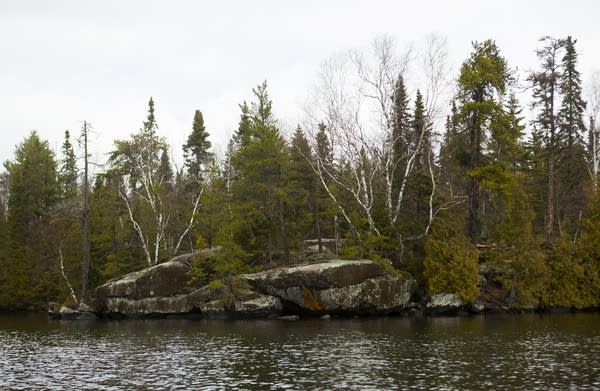Expired mineral leases latest flashpoint over mining near Boundary Waters

Go Deeper.
Create an account or log in to save stories.
Like this?
Thanks for liking this story! We have added it to a list of your favorite stories.
Updated 10:27 a.m. | Posted 4 a.m.
Fifty years ago Wednesday, two federal mineral leases were signed for rights to copper, nickel and precious metals, just south of what would become the Boundary Waters Canoe Area.
Those leases for the area south of Ely, Minn., are now in the hands of a mining company called Twin Metals — but they expired two and a half years ago. Renewal of the leases has languished in Washington, becoming the latest point of contention in a debate over whether mining should be considered so close to the BWCA.
Turn Up Your Support
MPR News helps you turn down the noise and build shared understanding. Turn up your support for this public resource and keep trusted journalism accessible to all.
The leases were first obtained by the International Nickel Company, which proposed 1,000-foot-deep open pit copper mine on the edge of the BWCA. But after a state moratorium to study the issue, copper prices tanked, and the project fizzled.
The federal Bureau of Land Management renewed the leases twice since then, with little fanfare.
But not this time. U.S. Rep. Betty McCollum, a St. Paul Democrat, introduced a bill to prevent copper-nickel mining near the BWCA. McCollum says those leases were granted before modern environmental laws were passed.
Becky Rom, who runs a campaign called Save the Boundary Waters, is pushing for a comprehensive assessment that would examine the potential impacts of copper-nickel mining in the entire watershed that drains into the Boundary Waters — before Twin Metals and other companies have even submitted specific mine plans. At least three other companies are also exploring deposits that could eventually lead to mines.
"It's not about a mine plan of operation," Rom said. "It's about this unique ecosystem. It's about the record of sulfide ore copper mining in the United States. It's about the value of the Boundary Waters. And what risk is tolerable risk?"
Rom says a broad review should ask the question: Is the water-rich Boundary Waters ecosystem, home to the nation's most popular wilderness area, the right place for copper mining?

"That can only be answered on the front end, not through review of a mine plan looking at a model prepared by the mining company's engineering company," Rom said.
Such a review could result in the Department of Interior making the area off limits to mining for 20 years. That would be similar to a step the Obama administration took in 2012, when it banned uranium mining on land bordering the Grand Canyon.
Twin Metals says conducting a full environmental impact statement on lease renewal applications would be unprecedented. Company officials declined an interview. But in a briefing provided to stakeholders last year, the company said conducting an EIS before it submits a mine plan of operation "could only analyze hypothetical and speculative mining activities not yet proposed."
U.S. Rep. Rick Nolan, a Democrat who represents northeastern Minnesota, agrees.
"It seems to me to be awfully hard to be doing, if not impossible, to do an environmental assessment, if you don't have a mining proposal in front of you, as to what they plan to do, what they intend to do," Nolan said.
The Bureau of Land Management says it's coordinating next steps with the U.S. Forest Service.
That looming federal decision has taken on even more significance since Gov. Mark Dayton laid out his strong opposition to mining near the Boundary Waters in March. He said Twin Metals would no longer have access to state land to develop its project.
Nolan says he's been assured there's no federal effort brewing to ban mining near the Boundary Waters.
Frank Ongaro with the industry group Mining Minnesota says there's a process in place to review mining proposals, and it needs to be allowed to work.
"We're very encouraged that it appears that the process will be allowed to move forward, as it was intended, without any administrative agency interference," he said.
Ongaro says that process is working right now with the proposed PolyMet mine. The company recently wrapped up more than 10 years of environmental review. It's expected to file its application for a permit to mine in the next few weeks.
Editor's note (June 1, 2016): The story has been updated to make clear that U.S. Rep. Betty McCollum's bill would prohibit only copper-nickel mining near the BWCA.




